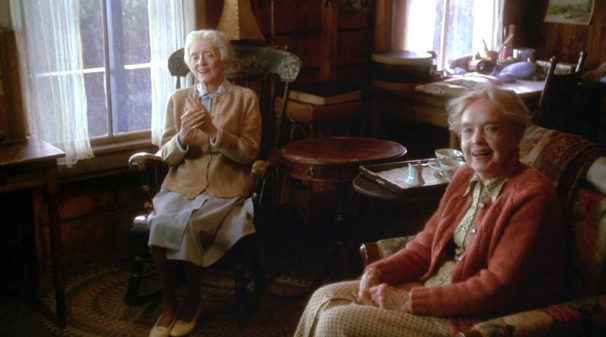
Ed note: The following is an excerpt from a long interview with film marketing strategist/producer-director Mike Kaplan, a friend of artsmeme, concerning the removal of the name of Lillian and Dorothy Gish from a screening auditorium at Bowling Green State University in Ohio. The university took this action in reaction to protests by African-American students decrying the racism of D.W. Griffith’s “The Birth of a Nation” (1915) in which Gish appeared. In a labor of love, Mike produced THE WHALES OF AUGUST (1989), Lillian Gish’s final film. He knew and revered her both personally and professionally. The interview, conducted by writer David Walsh and published on the World Socialist Website, merits reading. A germane excerpt here:
DW: Did you ever speak to the president of [Bowling Green State] university?
MK: No, I didn’t speak to him. I received a call back from the deputy chief of staff. He sent a copy of the task force report with a cordial note and the texts they put up near the theater. None of the texts mention any of Lillian’s films except The Birth of a Nation. They stress how racially provocative it was/is, a lightning rod for any discussion. Nothing about the rest of her life, her humanitarian efforts, her films. I don’t think anyone on the task force had seen any of her movies. Outrageous.
The report concluded that the texts on the wall were causing students to feel uncomfortable. The texts were disturbing because they were loaded, deliberately one-sided. It’s a disgrace they’re dishonoring and disrespecting her. Let alone Dorothy, her sister! She had nothing to do with the film. Dorothy’s just thrown under the bus with Lillian.
All their lawyerly language in the task force report is nonsense. It runs counter to everything a university is supposed to be about.

Lillian’s name was not on any of the publicity I’ve seen for The Birth of a Nation. She wasn’t on the poster. I just saw a handout they distributed in the movie theaters at that time. No actor’s name is mentioned. They keep saying she’s the star of the movie, that her career was defined by it, which is absurd and flagrantly ignorant of film scholarship. She was a supporting actor in an essential ensemble film. All of her iconic starring roles—in Broken Blossoms [1919], Way Down East [1920], Orphans of the Storm [1921], La Bohème [1926], The Scarlet Letter [1926], The Wind [1928], Night of the Hunter [1955]—came after The Birth of a Nation.
On Lillian Gish:
Lillian was the most enchanting person you could meet. Every time I left her presence I felt high. An incredible human being who epitomized the best of America. That’s why I wanted to make a movie with her….so that a new generation could see her in a major role. And that’s how The Whales of August eventually happened. And she was named “Best Actress” by the National Board of Review.
Excerpted from “A Conversation with Mike Kaplan,” author David Walsh, World Socialist Website, July 6, 2019
